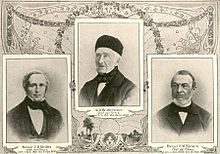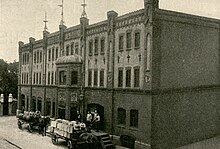Reidemeister & Ulrichs
Reidemeister & Ulrichs is a traditional import trading house for wine and spirits that specializes in delivering to the catering and hotel industries. The company, founded in Bremen in 1831 , has been part of the Bremen Eggers & Franke Group since 2005 , under whose roof it was merged with the company DC Gesellschaft für Weinimporte from Rüdesheim (Nahe) in 2009 . Reidemeister & Ulrichs is one of the leading wine trading companies in Germany.
Products
Reidemeister & Ulrichs is the exclusive sales partner of well-known wineries in Germany. These include Marchesi de 'Frescobaldi , M. Chapoutier from Tain l'Hermitage , Georges Duboeuf from Beaujolais , Reinhartshausen Castle and the Hess Family Estates .
history
1831 to 1899
The Reidemeister & Ulrichs company was established on January 1st, 1831 from the merger of two older Bremen wine shops: Ulrichs & Sohn and Wichelhausen & Reidemeister. The managing partners Carl Bartolomäus Ulrichs and Georg August Reidemeister agreed to set up a house at Sögestraße 25 in downtown Bremen as the headquarters of the joint company . Shortly afterwards, they moved into a larger building on Pelzerstrasse and the corner of Sögestrasse.
Since Bremen initially did not join the Zollverein , which was founded in 1834 , it remained abroad under customs law, which favored imports, but not deliveries to customers in the neighboring Kingdom of Hanover . That is why Reidemeister & Ulrichs set up a dispatch warehouse with duty-paid goods in front of the city gates in Burgdamm in 1841 . After the death of the company's founders Reidemeister († 1845) and Ulrichs († 1855), the widow Anna Margarethe Ulrichs ran the business together with the authorized signatory Heinrich Wilhelm Bömers, who had been with the company since 1850 and became a partner in 1857. In 1866, Friedrich Ulrichs, a son of the company's founder, also joined the company. After his early death, Heinrich Wilhelm Bömers was the sole head of the company, which he left to his 23-year-old son Heinrich Ferdinand Emil Bömers in 1887 . In 1889 he married a granddaughter of the company founder C. B. Ulrichs.
In 1888 Bremen joined the German customs area. At that time, the need for storage space for the prosperous wine store already included a packing house adjoining the parent company in Sögestraße and up to eleven other storage locations in downtown Bremen, which, in addition to the high administrative effort, now had to be individually kept under customs lock. Therefore, the decision was made to give up the parent company and to move the warehouse and office into a newly constructed multi-storey building with cellars in the street An der Brake, which was occupied in 1899.
Shortly before, in 1897, the Reidemeister & Ulrichs company acquired the Bremen vinegar house , which was threatened with demolition at the time, thus preserving the city's world-famous facade, which the South Kensington Museum in London had recently been interested in buying . A popular wine bar was set up and leased in the interior, which was remodeled according to plans by the architect Albert Dunkel .
1900 to 1969
On January 1, 1900, Hans Ulrichs, a grandson of C. B. Ulrichs and the authorized signatory Friedrich Sparkuhle were accepted as partners. In 1906 Reidemeister & Ulrichs acquired the Château Smith Haut Lafitte winery in one of the best wine-growing regions of Bordeaux . The acquisition underscored the importance that the trade in wines from this region had for the Reidemeister & Ulrichs company. Immediately after the First World War , however, this property was lost again through expropriation. In 1920 Heinz Bömers, a son of Heinrich Bömers, became a partner. When the wine business normalized after the currency reform in 1924, the company expanded strongly. In 1926 Reidemeister & Ulrichs opened a handling and tank facility in the free port in order to meet the growing demand for dessert and table wines. On the Brake, the handling of quality wines continued and the production of vermouth wines began at the same time . After prohibition was lifted in 1933, a company for the import of German wines was founded in New York , the Reidemeister & Ulrichs Corporation.
In 1932 Heinrich Bömers died, who had made a name for himself not only as a wine merchant, but also as a senator for the city of Bremen. In the 1930s, the isolation of Nazi Germany and its chronic currency shortage hampered the wine trade, and especially that with France. The Second World War and the subsequent reorganization of Europe meant for the Reidemeister & Ulrichs company the complete loss of their storage and production facilities due to destruction and also the loss of important sales markets that had previously been east of the Elbe.
In the first post-war years the company kept afloat with the production of a hot drink called Rundu . In 1946 at least the Essighaus reopened its doors in an emergency building. Only after the currency reform and with the establishment of the Federal Republic of Germany in 1949 was Reidemeister & Ulrichs able to build on its many years of experience and contacts in the wine trade. However, the trade in wine remained quota for a long time and was only fully liberalized with the conclusion of the wine market regulation of the European Economic Community in 1970.
By 1948, operations at An der Brake were restored. In the course of the urban redevelopment, the property in the immediate vicinity of the main train station had to be sold to the city of Bremen in 1950. In 1951 Reidemeister & Ulrichs therefore moved into the newly built, modern office building and port storage facility Auf der Muggenburg at Bremen's Europahafen as a functional building with offices, cellars and several floors. The rising demand made a new port facility for unloading wine tankers necessary, which was put into operation in 1953 only about 300 meters from the main building. Also in 1953 the company put its own wine tanker into service, the Vinum with a loading capacity of 640,000 liters, which operated for Reidemeister & Ulrichs until 1962. In 1954 a wine distillery was also set up on the Muggenburg.
1970 to 1989
In the course of the 1960s, the weight shifted from own bottling to importing bottled goods in the country of origin. The gradual introduction of the common market of the European Economic Community fundamentally changed the structures of the wine import trade. Under this impression, Reidemeister & Ulrichs changed in the 1970s from an importer and bottler to a branded sales partner with a well-organized sales organization and contractually secured sales rights.
The own bottling facility was closed and the warehouse and delivery logistics were outsourced. At the same time, long-term contracts for the distribution of internationally known brands in Germany were concluded under the Roland Markenimport company, which was founded in 1949, including Tio Pepe Sherry , Delaforce Port , Long John Whiskey and, in particular, Bordeaux wines from the House of Philippe de Rothschild .
In the early 1980s, Heinz and Michael Bömers, two sons of Seniors Heinz Bömers, who died in 1978, reorganized the Reidemeister & Ulrichs Group under the umbrella of the Bömers Holding Company. The reorganization enabled the company International Distillers & Vintners (IDV), whose cream liqueur Baileys was one of the company 's bestsellers, to participate temporarily in Roland Markenimport . At that time, the holding's equity investments included Reidemeister & Ulrichs and Roland Markenimport, who serve retail and gastronomy, the CAVIF - Caves des Grands Vins Français, founded in 1953 at Platz Bordeaux, and the oldest Bremen wine retailer, Ludwig von Kapff , through which primarily Private customers are served. In 1989 the group also acquired the Château du Grand Mouëys winery with 80 hectares of vineyards in the Premières Côtes de Bordeaux .
1990 until today
Because international spirits groups were increasingly taking their distribution into their own hands, the distribution of Roland Markenimport and Reidemeister & Ulrichs was merged in 1994 and the companies merged in 1995. The importance as a wine distribution partner continued to grow. With brands such as Rothschild (Baron Philippe), Antinori , Louis Jadot, Masi and Marqués de Caceres, Reidemeister & Ulrichs assumed a dominant position in the trade with high-quality wines in Germany in the 1990s.
In order to ensure success in the European market, the Bömers family decided in 2002 to sell the majority of Reidemeister & Ulrichs to the Dutch wine importer Baarsma. However, the traditional import trading company did not meet the expectations of the Dutch, who had promised themselves efficient access to the large German market and in particular to the food trade from the participation. Rather, its longstanding personal relationships with important suppliers suffered.
Since 2004, the Bremen-based wine trading company Eggers & Franke has been trying to take over the formerly important competitor. With the support of the Bömers family, who had retained a minority stake, Eggers & Franke acquired the Ludwig von Kapff company in April 2005 and 100% of the shares in Reidemeister & Ulrichs on August 1st of the same year. In the Eggers & Franke Group, which includes Joh. Eggers Sohn , another traditional company in the Bremen wine trade, Reidemeister & Ulrichs was to concentrate on the specialist trade and gastronomy customers.
In 2009 she briefly took over as Racke | Eggers & Franke, the company DC Gesellschaft für Weinimporte, Rüdesheim (Nahe), which was merged with Reidemeister & Ulrichs. In addition to the common warehouse at the Eggers & Franke Group's headquarters in Bremen, Reidemeister & Ulrichs also operates a sales office and delivery warehouse in Berlin . Distribution is through its own staff and in Germany about 24 sales representatives . In 2003, 2006, 2007 and 2011, Reidemeister & Ulrichs was honored with the title of Importer of the Year at the Mundus Vini international wine competition for the quality of the range .
Web links
- Website of MUNDUSvini - The Great International Wine Competition
- Reidemeister & Ulrichs website
- Website of the Eggers & Franke Group
Individual evidence
- ↑ Sascha Speicher: Top 100 in the wine industry . In: Weinwirtschaft . Issue 4/2012 of February 17, 2012, p. 108.
- ↑ Without author: Historical biographical sheets of the city of Bremen . Eckstein publishing house, Berlin 1906, p. 482.
- ↑ Without author: Historical biographical sheets of the city of Bremen . Eckstein publishing house, Berlin 1906, p. 483.
- ^ Karl Löbe in: Weinstadt Bremen . Verlag Heinrich Döll & Co., Bremen 1981, p. 140.
- ↑ Hartmut Roder : Bremen a wine trading center in the north of Germany . In: Bremer Handelgüter - Wine . Verlag H. M. Hauschild, Bremen 1997, p. 80.
- ↑ Company details Reidemeister & Ulrichs GmbH.
- ^ H. E. Kratz in: Chat about wine - 125 years of Bremen wine culture . Festschrift, published by Reidemeister & Ulrichs, Bremen 1956.
- ^ Hermann Gutmann in: Living with wine in Bremen and Umzu . Verlag H. M. Hausschild, Bremen 2003, p. 23.
- ↑ Hartmut Roder: Bremen a wine trading center in the north of Germany . In: Bremer Handelsgüter - Wine . Verlag HM Hauschild, Bremen 1997, p. 84.
- ↑ Company details Reidemeister & Ulrichs GmbH.
- ^ Hermann Gutmann in: Living with wine in Bremen and Umzu . Verlag H. M. Hausschild, Bremen 2003, p. 24.
- ^ Christoph Murmann: Hanseatic solution . In: Lebensmittel Zeitung . Issue 29 of July 22, 2005, p. 17.
- ↑ Christoph Murmann: Eggers & Franke saves R&U torso . In: Lebensmittel Zeitung . Issue 36 of September 9, 2005, p. 22.
- ↑ Company details Reidemeister & Ulrichs GmbH.
- ↑ http://www.mundusvini.de .





